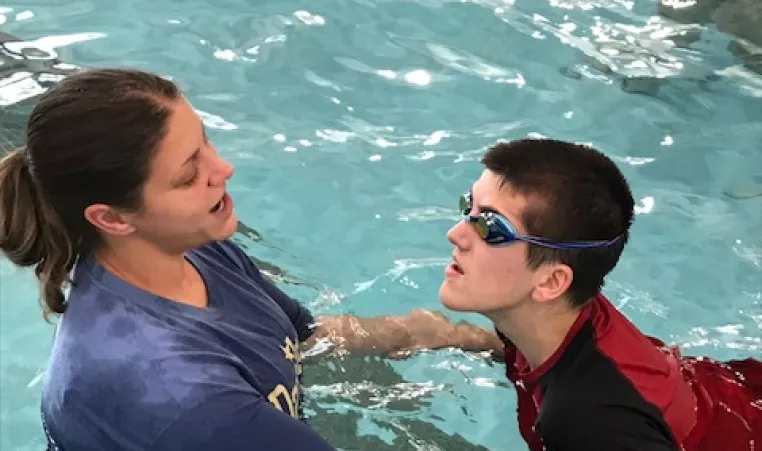Swimming and Water Safety Are the Focus

Missy Mundy admits that of all the programs offered to the 69 students at The Timothy School in Berwyn, one stands out to her above the rest.
The Timothy School, a non-profit school for children with autism, has been a partner with the Upper Main Line YMCA (UMLY) for more than 30 years. Under the supervision of the UMLY staff, the school’s students use UMLY’s pool to help teach them water safety, how to swim, float and be comfortable in the water. For a while, the school used different facilities for its swimming program but elected to return to UMLY a little while after it moved to its current location behind Conestoga High School in 1998.
“I love the swim program,” Mundy said. “I love all the programs, but I really love the swim program because we start when the kids are five. Many of our kids love the water. It’s a great medium for our kids because there’s no resistance in the water, so it makes it easier for them to move.”
While most kids are able to quickly take to the water, there are a few outliers that have their trepidations about it. In extreme cases, it can take up to a year or two for kids to get comfortable in the water, but for most, two to three weeks will do it. It helps to have teachers like the ones at UMLY, including Tracy Degerberg, Jackie Cattie, Susanna Grundstein and Danielle Yentz.
“Tracy Degerberg has been volunteering with our group for years and she knows the kids really well and she knows how to approach them,” Mundy said. “She knows how to calm the students who are having a difficult time getting used to the water and having water touch their heads. It’s a slow progression for some, and for some, it’s, ‘get in here and what are we going to do next?’”
Water safety is a huge YMCA point of emphasis, especially since drowning is the leading cause of accidental death in children one to four years old, and the second-leading cause in children ages 5-14. According to the National Autism Association, accidental drowning accounted for 91 percent of total U.S. deaths reported in children 14 and under with an Autism Spectrum Disorder subsequent to wandering/elopement.
“UMLY’s partnership with the Timothy School is incredibly important to us because it helps the YMCA play a critical role in the everyday development of these kids,” UMLY Senior Executive Director Helen Flanders said. “It’s such a great feeling to see the growth and change in the kids as they progress, and they love coming to the Y. Their swimming lessons help keep them safe, especially since accidental drowning is so prevalent in the younger autism community.”
Autism Speaks recommends that parents of children with autism create safety plans, including safety around water and swimming pools. If you'd like to learn more about traveling with ASD: https://www.bankrate.com/insurance/car/traveling-with-asd/.
Jump in the Pool
The sessions are usually broken down into 45 minutes of organized lessons and 15 minutes of free swim. As expected, those final 15 minutes are always well-received, particularly with the abundance of options available. UMLY’s brand-new indoor pool, which just opened in September, also features a slide that the older students are permitted to use. Some are initially apprehensive, but it doesn’t take long for them to brave it.
“It’s not just the skills, the swimming and the water safety. We’re teaching confidence and self-esteem, the ability to take a risk,” Mundy added. “It’s everything that helps make us be what everybody else is. These are all the skills that we need to work on to make us be better at who we are and those are the same skills that we want to give our kids so they can be the best that they can be.”
Understanding Autism
The swim program doesn’t take long to do wonders for a student’s confidence. Once the kids get in the water, they start to get more comfortable, and usually, a massive upgrade in confidence follows along.
“I see a tremendous jump in confidence. I go the first week that they go over and it’s good to see where they are,” Mundy said. “Then I go back later and I see them and I’m just absolutely amazed because you can see the comfort level that has increased in all of the students and their ability to interact with people that are not on our staff. That’s really important because it’s a community setting and it’s important for our kids. Our two biggest deficits for our children here are the ability to communicate and to socialize. Here they are in a setting where they have to do both, which is fantastic.”
In addition to swimming, the Timothy School’s children also participate in wellness activities in UMLY’s Wellness Center.
“I think that’s why the Upper Main Line YMCA is a critical partner for us, because it gives our kids the ability to develop fitness skills for the duration of their lives, which is essential and it’s such a benefit to them to be able to maintain a healthy lifestyle,” Timothy School Executive Director Dr. Matt Riley said. “[The kids] can also practice the lessons that they learned in our school building in that facility and generalize those skills which is a critical thing that we’re trying to develop when we’re educating individuals with autism.”
If you’re at the Upper Main Line YMCA, you’ll probably see the Timothy School’s great students in the pool, and because of that, you’ll know that the pool is helping them improve their everyday lives.
“We don’t teach autistic children. We teach children with autism,” Mundy said. “When we teach a child, we teach someone who’s going to turn into an adult and it’s not just their learning difference that makes up who they are. They’re a whole person and we have to take that whole person into account.”